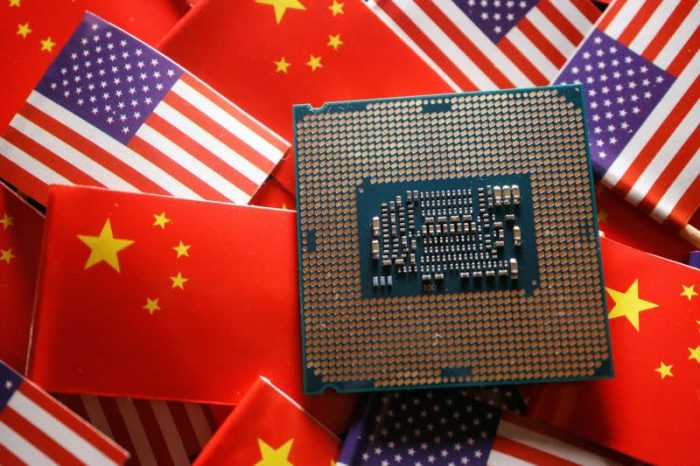China said on Thursday it is “gravely concerned” about the US move to impose investment curbs on computer chips and other sensitive technology.
US President Joe Biden signed an executive order on Wednesday that will prohibit US investment in “narrow subsets” of sensitive technology in China.
The ban focuses on semiconductors, quantum tech and artificial intelligence – areas where the US, Japan and the Netherlands have dominated, and where China has worked to develop homegrown alternatives.
A statement from China’s Commerce Ministry accused Washington of “hindering global economic and trade exchanges and cooperation”, and setting up “obstacles for the recovery of the world economy”.
The Chinese foreign ministry, meanwhile, said officials had lodged solemn representations with the US. It said the country was “strongly dissatisfied” with and “resolutely opposes the US’s insistence on introducing investment restrictions on China”.
ALSO SEE: Chinese Tech Giants Rush to Buy Nvidia’s Top AI Chips – FT
While the move may fuel tensions with Beijing, the new regulations may not be imposed until well into 2024 – an election year – once feedback is gathered from the investment community.
The order, which will not be retroactive, aims to stem the flow of US capital to tech that could also boost China’s military modernization.
The restrictions will apply to China, plus Hong Kong and Macau, which are separate customs territories from the mainland. Other countries could be added to the regulations later, a senior official said.
UK and Europe considering similar moves
Biden sent a letter to Congress declaring a national emergency over the issue and hours earlier spoke to an audience in New Mexico emphasizing domestic investment.
“We’re continuing to make progress in fixing the supply chain. For example, we couldn’t access semiconductors during the pandemic because the factories making them overseas were shut down.
“You all know semiconductors are those little small computer chips about the size of the end of your fingertip they’re effectively in everything in our lives.”
The White House said Biden consulted allies on the plan and incorporated feedback from Group of Seven nations.
Officials said US officials, including Treasury Secretary Janet Yellen, had repeatedly and clearly told Beijing that Washington would narrowly limit the restrictions.
No coordinated action by allies was expected on Wednesday, although Britain and the European Union have already signalled their intention to move along similar lines, and the G7 advanced economies agreed in June that restrictions on outbound investments should be part of their overall toolkit.
‘Some deals will be banned’ once rules start
The Treasury issued an advance notice on the rules, saying some deals would be banned once the regulations kick in, and investors must notify the government of their plans on others.
The outbound investment programme would require notification of many investments while prohibiting only a few.
Officials said the goal is to avert the “most acute” national security risks by regulating investments in Chinese companies and entities in areas that could give China military and intelligence advantages.
The US already bans or restricts the export to China of many technologies and products, but restricting investment would prevent US funds from helping China cement its domestic capabilities, which could undermine existing export controls and inbound investment screening programmes.
Treasury would have the authority to investigate potential violations and pursue available penalties, officials said, adding that it could also unwind future investments.
Treasury said the programme was expected to focus on US persons engaged in transactions that could convey “intangible benefits” to Chinese entities, including equity interests, greenfield investments and joint ventures.
Exceptions possible for public securities, and funds
It is considering creating an exception for investments in publicly traded securities, index funds, mutual funds and other instruments that were less likely to result in intangible benefits.
Treasury said it was considering banning US investments in Chinese development of electronic design automation software or semiconductor manufacturing equipment; the design, fabrication, or packaging of advanced integrated circuits; and the installation or sale of supercomputers.
It was considering requiring notification for investments in firms working on the design, fabrication, and packaging of less advanced integrated circuits.
US investments in Chinese production of quantum computers, development of certain quantum sensors, and quantum networking and communication systems could also be banned.
In the AI sector, Treasury said it is considering notification requirements for US investments in Chinese entities working on software that incorporates an AI system and could have military or intelligence applications.
It is also asking stakeholders how to shape a prohibition on US investments in Chinese activities related to software that incorporates an AI system and is designed for uses that could have national security implications, to ensure any measures are “appropriately tailored” in the final rules.
- Reuters with additional editing by Jim Pollard
NOTE: The headline and initial paragraphs of this report were amended on August 10, 2023.
ALSO SEE:
Dutch Restrict Chip Exports Amid US Push to Tighten China Curbs
Banned Nvidia Chips Available in China’s Underground Markets
US Chip Sanctions Have Hardly Impacted China’s AI Capability
US Backers Like Intel, Qualcomm ‘Poured Billions’ Into China AI
Chinese Supercomputer Achieves ‘Brain-Scale’ AI Model – SCMP
























